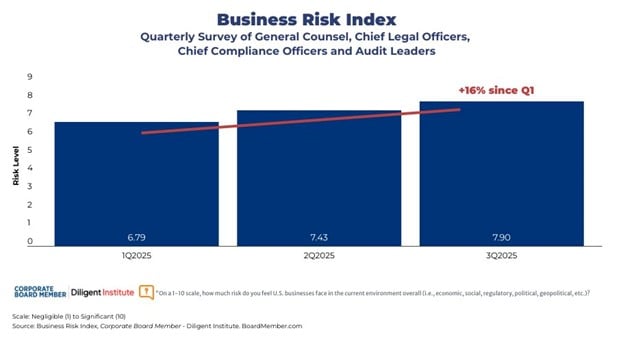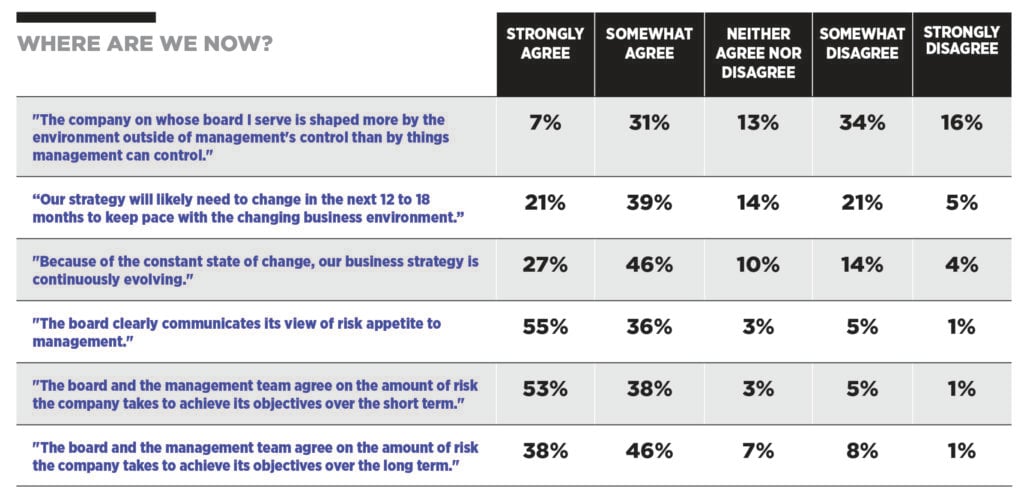New leadership of major global economies, among other shifting geopolitical trends, has redefined the global trade landscape, and the disruptions show no sign of slowing down.
In particular, the implementation of tariffs by the U.S. has triggered a chain reaction, calling for immediate adjustments and adaptations on pricing, supply chains and compliance operations, with numerous implications for long-term growth strategy still unfolding.
Given the ongoing pace of change, boards must view geopolitical shifts through a strategic assessment lens, treating them as more than just a backdrop to business operations.
According to a recent report from FTI Consulting, Corporate Board Member and Diligent Institute, 76 percent of surveyed board members said the “continuation, resurgence or emergence of a geopolitical event in a region of operation” would have “some impact” or a “significant impact” on strategy.
Here are four expert recommendations for how companies and their boards can approach the current political and economic landscape:
1. Build Sustainable Strategies
In April, the White House announced tariffs on around 90 countries globally, as well as a 10 percent across-the-board tax on imports. What comes next is hard to predict, given the use of executive orders for trade and the role of federal courts in blocking tariffs. And the rise of competing trade blocs and weakening multilateral institutions means further uncertainty.
For companies with a multinational presence, this means that boards need to keep track of new trade partnerships and developments globally and the knock-on effect on supply chains, capital, workforces and governance.
Regardless of perspective, the era of trade stability is over, and volatility is a new norm. In this new world, boards must take into account the political motives behind trade actions and policies in their strategy and understand the cascading impact.
“In a multipolar world, trade policy will become more strategic, regional and grounded in national security, so understanding and addressing the political forces driving trade fragmentation is critical to building a sustainable plan for long-term growth,” said Cory Fritz, senior managing director, strategic communications at FTI Consulting. “Companies that lean into transparency, innovation and localization will have a strategic advantage.”
2. Get Ready to Pivot
With so much changing every day, companies may need to quickly reposition themselves. U.S. companies may face perception risks abroad, while companies based elsewhere may be trying to figure out how to account for stateside political and economic volatility.
Boards in Europe might feel that they are caught between U.S. and EU policies; boards in the UK might choose to explore risk-adjusted capital planning; and boards in the Asia-Pacific region might fortify supply chain resilience through diversified trade relationships.
But no matter where a company is based, boards must adapt to domestic and international trade winds and their potential to rapidly change.
“Trade volatility will likely be a norm in the coming years,” said Sally Peng, senior managing director, export controls, sanctions and trade at FTI Consulting. “Amid all the unpredictability, it is essential for companies and their board members to remain agile,” she said. “Boards can’t afford to treat geopolitical volatility as a passing headline.”
3. Follow the Trade Winds
According to the 2025 What Directors Think study, only 8 percent of surveyed board members consider geopolitics and international expertise as a priority in their search for directors. While that is nearly double last year’s finding, it is still indicative that up until recently, global affairs acumen wasn’t considered a critical skillset for board refreshment.
Given that trade policy is being instrumentalized by various governments as a tool of domestic and foreign leverage, boards need to keep a close eye on political developments globally and engage in geopolitical scenario planning that creates favorable impact locally. These kinds of contingency exercises are crucial for organizations to ensure effective cross-border dealmaking, compliance with international regulations and operational continuity.
“For 70 years the world steadily built a truly globalized economy and in the past few years, we have started to rapidly alter the foundation on which that economy was built. For corporate directors, that means long-term strategic planning and risk mitigation are inextricably linked to geopolitical trade winds,” reminded Pat Tucker, senior managing director, M&A, activism & governance at FTI Consulting.
“It is impossible to think about responsible capital allocation without considering how trade dynamics could impact costs and, more importantly, create opportunities.”
4. Implement Resilient Governance
Companies and their boards must be proactive in how they approach governance. Rapidly changing external factors such as regulations, economic factors, social and environmental requirements, technological advancements, cybersecurity and geopolitical events, coupled with governmental institutional shifts, mean that the ability of a board to quickly adapt to disruptions with responsive strategy is critical.
Boards must ensure stakeholder alignment and facilitate cross-functional planning to anticipate and respond to various developments. Ongoing uncertainty must shape the overall strategic approach to governance, which may mean anticipating longer-term regulatory, economic and political instability and scenario planning based on them.
But “despite ongoing political and economic uncertainty in the U.S. and abroad, many countries and jurisdictions are coalescing around similar sustainability reporting standards. Further transparency is inevitable and knowing your organization’s data isn’t just good governance, it also gives you an advantage in the long run,” said Miriam Wrobel, senior managing director, ESG & sustainability advisory at FTI Consulting.
Added Brian Kushner, senior managing director, corporate finance & restructuring: “The board should lead the way toward organizational resilience by implementing proactive risk monitoring, utilizing innovative playbooks to mitigate or adapt to the risks of today, and being able to manage multiple crises simultaneously.”
Often this takes the form of adding additional expertise (e.g., geopolitical risk assessment) and responsibility to one of the board committees, like the finance, risk or technology committees (if they exist) or creating a strategy and operations committee to effectively create a cross-functional war room to address and manage uncertainties and risks as they arise.
Meredith Griffanti, senior managing director, cybersecurity & data privacy communications at FTI Consulting, says she still hears directors asking all the wrong questions about cybersecurity. “They are focused on prevention, which is unrealistic in today’s evolving geopolitical landscape ripe with opportunities for threat actors.”
“From social engineering to the use of AI, to data extortion, the world has been seeing the largest and most sophisticated organizations and cyber programs fall to cybercrime. It is no longer about prevention; it is now a matter of preparation,” Griffanti says.
“What I’d love to see more of in the boardroom is directors taking the initiative to look under the hood and challenge the cyber governance structure and decision-making processes as well as the organization’s resilience and recovery protocols.”







